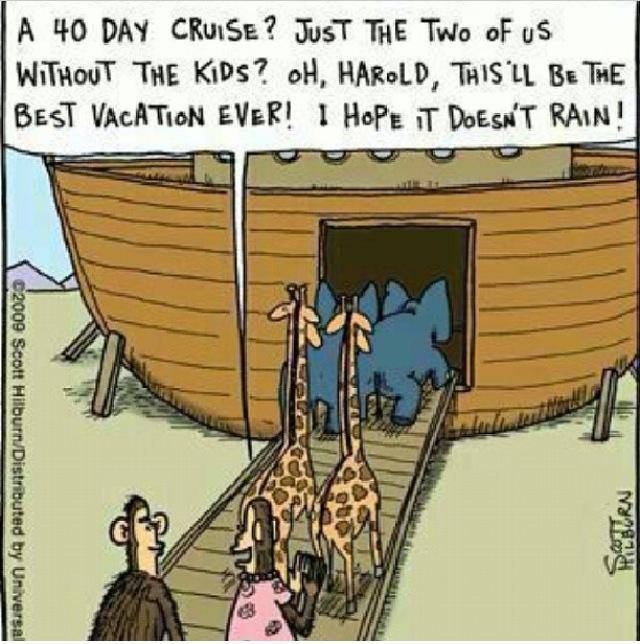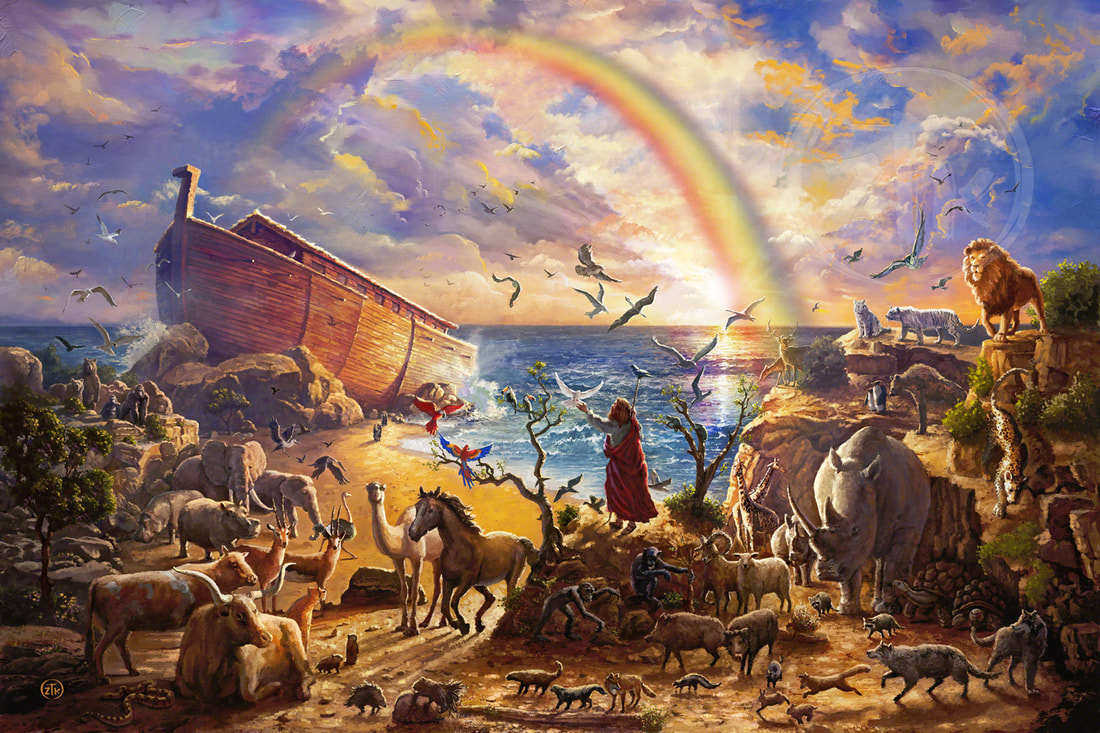Bonjour / Hello [nickname_else_first_name],
Table of contents
1) Perashat Hashavoua - Rabbi Eli Mansour
2) Halakhat Hashavoua (Halakhot related to day to day life)
Praying Arvit- Hazzan David Azerad
3) Holy Jokes!
1)PERASHAT HASHAVOUA
This Week's Parasha Insight with Rabbi Eli Mansour
Parashat Noah- Teaching With Passion and Conviction
The opening verse of Parashat Noah tells us, "Et Ha’Elokim Hit’halech Noah" – that Noah "walked with G-d." The Seforno (Rav Ovadia Seforno, Italy,1474-1550) explains this to mean that Noah dealt kindly with other people, and sought to help them, just as G-d dispenses kindness and helps people. Specifically, the Seforno writes, Noah reprimanded his contemporaries, in an attempt to convince them to cease their evildoing and conduct themselves properly. Whereas many assume that Noah did not try to lead the people of his time to repent, the Seforno claims that Noah indeed expended great efforts seeking to uplift and inspire the sinners of his generation. He followed G-d’s example of kindness by working to help the people of his time improve their behavior.
In fact, the Seforno writes later (6:10) that it was only once Noah began reprimanding the people of his time that he was blessed with children. The Torah tells that Noah begot children at the age of 500 – at a much more advanced age than others – and the Seforno maintains that this was because he was granted the blessing of children only after he started making efforts to lead his contemporaries to repent.
Of course, as we know, Noah’s efforts were unsuccessful. His teachings had no effect upon the people, and they persisted in their evildoing, until eventually G-d decided to annihilate all of mankind.
We might ask, why were his efforts unsuccessful? How is it possible that he was unable to impact anybody?
The answer might be that Noah did not truly believe that the sinful people of his time were capable of repenting.
In order for a teacher or rabbi to succeed in inspiring those under his charge, he needs to approach his work with conviction, with passion. He needs to believe wholeheartedly everything he says. If he is trying to convince people to change, he needs to believe in his heart that they can change. Noah, it seems, lacked this conviction. He spoke dispassionately, because he doubted whether he could have any impact. He assumed that the people had fallen too low, that they had drifted too far from proper conduct, to ever improve.
Noah failed to realize that very often, it is specifically when people hit "rock bottom" that they are open and receptive to calls for change. Many Ba’aleh Teshuba became influenced to embrace religious observance after having fallen to the lowest depths, when their lives became empty and devoid of meaning and substance. When a person reaches this point, he is looking to change – and it is precisely then when one has the greatest chance of influencing that individual and inspiring him to change. The people in Noah’s time were capable of change specifically because they had sunken to such depths, because they had become so evil and debased. But Noah doubted their capacity to change, and so his efforts were tepid and ultimately unsuccessful.
We should never doubt a person’s ability to change. No matter where a person is, no matter how distant he might be from G-d, from Torah, and from a Torah lifestyle, he is capable of changing and returning to observance. Once we recognize this truth, and acknowledge the great potential within each and every person, regardless of his current state, we will speak with greater passion and conviction, and will then be able, with G-d’s help, to inspire our fellow Jews to draw closer to Torah observance, one step at a time.
2) HALAKHAT HASHAVOUA
Halacha, according to the rulings of Rabbi Obadiah Yosef ZT”L
Is praying Arvit Voluntary or Obligatory ?
If one was in the midst of reciting the Amida prayer and then suddenly remembers that he has already prayed this prayer, one must stop praying immediately, for all of one’s blessings are considered blessings in vain. One may not continue for the remainder of the Amida to pray on a voluntary basis. One cannot pray half a prayer on an obligatory basis and the other half on a voluntary basis.
Indeed, the Rambam (Chapter 10 of Hilchot Tefillah) likewise rules in accordance with the majority of the Poskim that one who begins praying and then remembers that he has already recited this prayer must immediately stop praying and may not conclude it on a voluntary basis.
Nevertheless, the Rambam writes that if this happens during the Arvit prayer, i.e. if one begins praying the Arvit Amida and then suddenly remembers that he has already prayed Arvit, one may, in fact, continue one’s prayer on a voluntary basis. The reason for this is because there is a distinction between the Shacharit and Mincha prayers versus the Arvit prayer, for the Gemara states that Arvit was only established by our Sages as a voluntary prayer and not as an obligatory prayer. Thus, whenever one prays Arvit, this is not being done on a fully obligatory basis and one is merely praying on a voluntary basis. Thus, if one remembers in the middle of reciting the Arvit prayer that one has already prayed, one may continue this prayer, for even beforehand, this prayer was likewise only on a voluntary basis.
On the other hand, Rabbeinu Mano’ach rebuffs the Rambam’s opinion, for although our Sages originally established the Arvit prayer as a voluntary prayer, later, this prayer was established in an obligatory manner and every Jewish man must pray Arvit every day. If so, nowadays, there is no halachic distinction between the Shacharit, Mincha, and Arvit prayers. Some write that the Ra’avad agrees to Rabbeinu Mano’ach’s approach in that the entire Jewish nation has accepted the Arvit prayer as an obligatory prayer and there is no reason to differentiate between one prayer and another.
Nevertheless, Maran Ha’Shulchan Aruch writes in his commentary on the Rambam, Kesef Mishneh, that this reasoning is insufficient to rebuff the words of the Rambam, for originally Arvit was established as a voluntary prayer and thus ultimately, it does not share the same status as the other prayers which were established as completely obligatory prayers already in the times of our Sages and there is thus room to uphold the opinion of the Rambam in this regard. Therefore, it seems that the ruling on this issue follows the Rambam and if one begins praying Arvit and then remembers that he has already recited this prayer, one may continue one’s prayer on a voluntary basis.
However, in his Shulchan Aruch, Maran makes no mention of a distinction between Shacharit and Mincha and Arvit. It would therefore seem that Maran means to rule in accordance with the opinion of Rabbeinu Mano’ach and the Ra’avad, unlike the Rambam. The Magen Avraham, Rabbeinu Yehuda Ayash, and others interpret the words of the Shulchan Aruch in this manner.
Nonetheless, Maran Rabbeinu Ovadia Yosef zt”l proves beyond a shadow of a doubt that the Ra’avad does not disagree with the Rambam regarding this issue and he writes that even according to the Ra’avad, one may continue one’s Arvit prayer on a voluntary basis. He proceeds to quote several other Poskim who rule likewise and write that even according to Maran Ha’Shulchan Aruch, the Halacha follows the opinion of the Rambam and if one begins reciting the Arvit Amida prayer and then remembers that he has already recited this prayer, one may continue with the Amida prayer on a voluntary basis.
Summary: One who begins the Arvit prayer and then remembers that he has already prayed Arvit may continue reciting the Amida on a voluntary basis.
Bevirkat Shabbat Shalom Umevorach
David Azerad
3) HOLY JoKeS!!
Selection of funny snippets, loosely related to this weeks parashah, to brighten your day
Q. Why did Noah have to punish and discipline the chickens on the Ark?
A. Because they were using "fowl" language.
Q. On the Ark, Noah probably got milk from the cows. What did he get from the ducks?
A. Quackers.
Q. When was the first meat mentioned in the Bible?
A. When Noah took Ham into the ark.
Q: Who was the greatest financier in the Bible?
A: Noah – he was floating his stock while everyone else was in liquidation.
Q: What kind of lights were on the ark?
A: Floodlights.
Q: Did all the animals on the ark come in pairs?
A: No the worms came in apples.
Q: Why didn't Noah go fishing?
A: He only had two worms!
Q. Which animal on Noah's Ark had the highest level of intelligence?
A. The giraffe.
Q: How do we know that they played cards in the ark?
A: Because Noah sat on the deck.
Q: What animal could Noah not trust?
A: The Cheetah.
Q: What money did Noah carry into the ark?
A: Bucks and doe.
Q: Why were the horses aboard the ark Pessimistic?
A: They were always saying neigh.
Alice: Grandma, were you on Noah's ark?
Grandma: No.
Alice: then how did you survive the flood?














